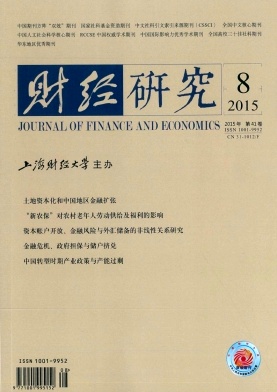住房资产、价格波动与我国城镇居民消费行为——基于传导渠道的分析
财经研究 2015 年 第 41 卷第 08 期, 页码:
摘要
参考文献
摘要
文章在最优跨期消费选择模型的基础上引入了居民的借贷约束和预防性动机,推导出检验房价波动对消费的直接财富效应、流动性约束效应和预防性储蓄效应的实证分析框架,然后根据不同渠道作用机理的差异,利用普通面板回归模型和门槛面板回归模型进行了实证检验。研究发现,2003年以后,房价上升对城镇居民的消费具有微弱的财富效应,从影响渠道来看,主要是通过预防性储蓄渠道,其次是流动性约束渠道实现的,而直接财富效应并不明显。这种作用主要体现在对大额耐用消费品支出以及支配自由度较大、往往具有享受特征的消费支出的促进上。这一时期房价上升带来的财富增加只是在一定程度上降低了居民对不确定性的谨慎程度,缓解了居民在面对大额刚性支出时所受到的流动性约束,从而降低了消费对当期收入的敏感性。
[1]陈斌开,杨汝岱.土地供给、住房价格与中国城镇居民储蓄[J].经济研究,2013,(1):110-122.
[2]陈健,陈杰,高波.信贷约束、房价与居民消费率——基于面板门槛模型的研究[J].金融研究,2012,(4):45-57.
[3]段忠东.房价变动对居民消费影响的门限测度——基于中国35个大中城市的实证研究[J].经济科学,2014,(4):27-38.
[4]况伟大.房价变动与中国城市居民消费[J].世界经济,2011,(10):21-34.
[5]黄静,屠梅曾.房地产财富与消费:来自于家庭微观调查数据的证据[J].管理世界,2009,(7):35-45.
[6]李春凤,陈乐一,刘建江.房价波动对我国城镇居民消费的影响研究[J].统计研究,2013,(2):14-22.
[7]李涛,陈斌开.家庭固定资产、财富效应与居民消费:来自中国城镇家庭的经验证据[J].经济研究,2014,(3):62-75.
[8]李文星,徐长生,艾春荣. 我国人口年龄结构和居民消费:1989—2004[J].经济研究,2008,(7):118-129.
[9]王柏杰,何炼成,郭立宏.房地产价格、财富与居民消费效应——来自中国省际面板数据的证据[J].经济学家,2011,(5):57-65.
[10]王培辉,袁薇.中国房地产市场财富效应研究——基于省际面板数据的实证分析[J].当代财经,2010,(6):92-98.
[11]王松涛,刘洪玉.以住房市场为载体的货币政策传导机制研究——SVAR模型的一个应用[J].数量经济技术经济研究,2009,(10):61-73.
[12]王子龙,许萧迪.房地产市场广义虚拟财富效应测度研究[J].中国工业经济,2011,(3):15-25.
[13]汪伟.中国居民储蓄率的决定因素——基于1995-2005年省际动态面板数据的分析[J].财经研究,2008,(2):53-64.
[14]严金海,丰雷.中国住房价格变化对居民消费的影响研究[J].厦门大学学报(哲学社会科学版),2012,(2):71-78.
[15]杨赞,张欢,陈杰.再购房潜在动机如何影响住房的财富效应——基于城镇住户大样本调查数据的微观层面分析[J].财经研究,2014,(7):54-64.
[16]余仁成.流动性约束和不确定性与中国农村居民消费行为分析[D].湖南大学硕士学位论文,2009.
[17]Benito A, Thompsom J, Waldron M, et al. House prices and consumer spending[R]. Bank of England Quarterly Bulletin, 2006.
[18]Benito A. Housing equity as a buffer: Evidence from UK households[R]. Working Paper No.324, Bank of England, 2007.
[19]Browning M, Lusardi A. Household saving: Micro theories and micro facts[J]. Journal of Economic Literature, 1996, 34(4):1797-1855.
[20]Campbell J Y, Cocco J. How do house prices affect consumption? Evidence from micro data[J]. Journal of Monetary Economics, 2007, 54(3): 591-621.
[21]Caner M, Hansen B E. Instrumental variable estimation of a threshold model[J]. Econometric Theory, 2004, 20(5): 813-843.
[22]Carroll C D, Otsuka M, Slacalek J. How large are housing and financial wealth effects? A new approach[J]. Journal of Money,Credit and Banking, 2011, 43(1):55-79.
[23]Case K E, Quigley J M, Shiller R J. Comparing wealth effects: The stock market versus the housing market[J]. Advances in Macroeconomics, 2005, 5(1):1-32.
[24]Chamon M, Prasad E. Why are saving rates of urban households in China rising?[J]. American Economic Journal: Macroeconomics, 2010, 2(1): 93-130.
[25]Chen J. Reevaluating the association between housing wealth and aggregate consumption: New evidence from Sweden[J]. Journal of Housing Economics, 2006, 15(4): 321-348.
[26]Chen N K, Chen S S, Chou Y H. House prices, collateral constraint, and the asymmetric effect on consumption[J]. Journal of Housing Economics, 2010, 19(1): 26-37.
[27]Cho S. Housing wealth effect on consumption: Evidence from household level data[J]. Economics Letters, 2011, 113(2): 192-194.
[28]Ciarlone A. Housing wealth effect in emerging economies[J]. Emerging Markets Review, 2011, 12(4): 399-417.
[29]Christensen I, Corrigan P, Mendicino C, et al. Consumption, housing collateral, and the Canadian business cycle[R]. Working Paper No.26, Bank of Canada, 2009.
[30]Gan J. Housing wealth and consumption growth: Evidence from a large panel of households [J]. Review of Financial Studies, 2010, 23(6): 2229-2267.
[31]Hansen B E. Threshold effects in nondynamic panels: Estimation, testing, and inference[J]. Journal of Econometric, 1999,93(2):345-368.
[32]Iacoviello M. Consumption, house prices, and collateral constraints: A structural econometric analysis[J]. Journal of Housing Economics, 2004,13(4): 304-320.
[33]Lehnert A. Housing, consumption and credit constraints[R]. FEDS Working Paper No.63, 2004.
[34]Lustig H, Van Nieuwerburg S. How much does household collateral constraint regional risk sharing?[R]. NBER Working Paper No.10505, 2004.
[35]Miller N, Peng L, Sklarz M. House prices and economic growth[J]. Journal of Real Estate Finance and Economics, 2011, 42(4): 522-541.
[36]Peltonen T A, Sousa R M, Vansteenkiste I S. Wealth effects in emerging market economies[J]. International Review of Economics and Finance, 2012, 24: 155-166.
[37]Sousa R M. Financial wealth, housing wealth, and consumption[J]. International Research Journal of Finance and Economics, 2008, 19: 167-191.
[38]Veirman D E, Dunstan A. Does wealth variation matter for consumption?[R]. Reserve Bank of New Zealand Discussion Paper No.02, 2010.
[2]陈健,陈杰,高波.信贷约束、房价与居民消费率——基于面板门槛模型的研究[J].金融研究,2012,(4):45-57.
[3]段忠东.房价变动对居民消费影响的门限测度——基于中国35个大中城市的实证研究[J].经济科学,2014,(4):27-38.
[4]况伟大.房价变动与中国城市居民消费[J].世界经济,2011,(10):21-34.
[5]黄静,屠梅曾.房地产财富与消费:来自于家庭微观调查数据的证据[J].管理世界,2009,(7):35-45.
[6]李春凤,陈乐一,刘建江.房价波动对我国城镇居民消费的影响研究[J].统计研究,2013,(2):14-22.
[7]李涛,陈斌开.家庭固定资产、财富效应与居民消费:来自中国城镇家庭的经验证据[J].经济研究,2014,(3):62-75.
[8]李文星,徐长生,艾春荣. 我国人口年龄结构和居民消费:1989—2004[J].经济研究,2008,(7):118-129.
[9]王柏杰,何炼成,郭立宏.房地产价格、财富与居民消费效应——来自中国省际面板数据的证据[J].经济学家,2011,(5):57-65.
[10]王培辉,袁薇.中国房地产市场财富效应研究——基于省际面板数据的实证分析[J].当代财经,2010,(6):92-98.
[11]王松涛,刘洪玉.以住房市场为载体的货币政策传导机制研究——SVAR模型的一个应用[J].数量经济技术经济研究,2009,(10):61-73.
[12]王子龙,许萧迪.房地产市场广义虚拟财富效应测度研究[J].中国工业经济,2011,(3):15-25.
[13]汪伟.中国居民储蓄率的决定因素——基于1995-2005年省际动态面板数据的分析[J].财经研究,2008,(2):53-64.
[14]严金海,丰雷.中国住房价格变化对居民消费的影响研究[J].厦门大学学报(哲学社会科学版),2012,(2):71-78.
[15]杨赞,张欢,陈杰.再购房潜在动机如何影响住房的财富效应——基于城镇住户大样本调查数据的微观层面分析[J].财经研究,2014,(7):54-64.
[16]余仁成.流动性约束和不确定性与中国农村居民消费行为分析[D].湖南大学硕士学位论文,2009.
[17]Benito A, Thompsom J, Waldron M, et al. House prices and consumer spending[R]. Bank of England Quarterly Bulletin, 2006.
[18]Benito A. Housing equity as a buffer: Evidence from UK households[R]. Working Paper No.324, Bank of England, 2007.
[19]Browning M, Lusardi A. Household saving: Micro theories and micro facts[J]. Journal of Economic Literature, 1996, 34(4):1797-1855.
[20]Campbell J Y, Cocco J. How do house prices affect consumption? Evidence from micro data[J]. Journal of Monetary Economics, 2007, 54(3): 591-621.
[21]Caner M, Hansen B E. Instrumental variable estimation of a threshold model[J]. Econometric Theory, 2004, 20(5): 813-843.
[22]Carroll C D, Otsuka M, Slacalek J. How large are housing and financial wealth effects? A new approach[J]. Journal of Money,Credit and Banking, 2011, 43(1):55-79.
[23]Case K E, Quigley J M, Shiller R J. Comparing wealth effects: The stock market versus the housing market[J]. Advances in Macroeconomics, 2005, 5(1):1-32.
[24]Chamon M, Prasad E. Why are saving rates of urban households in China rising?[J]. American Economic Journal: Macroeconomics, 2010, 2(1): 93-130.
[25]Chen J. Reevaluating the association between housing wealth and aggregate consumption: New evidence from Sweden[J]. Journal of Housing Economics, 2006, 15(4): 321-348.
[26]Chen N K, Chen S S, Chou Y H. House prices, collateral constraint, and the asymmetric effect on consumption[J]. Journal of Housing Economics, 2010, 19(1): 26-37.
[27]Cho S. Housing wealth effect on consumption: Evidence from household level data[J]. Economics Letters, 2011, 113(2): 192-194.
[28]Ciarlone A. Housing wealth effect in emerging economies[J]. Emerging Markets Review, 2011, 12(4): 399-417.
[29]Christensen I, Corrigan P, Mendicino C, et al. Consumption, housing collateral, and the Canadian business cycle[R]. Working Paper No.26, Bank of Canada, 2009.
[30]Gan J. Housing wealth and consumption growth: Evidence from a large panel of households [J]. Review of Financial Studies, 2010, 23(6): 2229-2267.
[31]Hansen B E. Threshold effects in nondynamic panels: Estimation, testing, and inference[J]. Journal of Econometric, 1999,93(2):345-368.
[32]Iacoviello M. Consumption, house prices, and collateral constraints: A structural econometric analysis[J]. Journal of Housing Economics, 2004,13(4): 304-320.
[33]Lehnert A. Housing, consumption and credit constraints[R]. FEDS Working Paper No.63, 2004.
[34]Lustig H, Van Nieuwerburg S. How much does household collateral constraint regional risk sharing?[R]. NBER Working Paper No.10505, 2004.
[35]Miller N, Peng L, Sklarz M. House prices and economic growth[J]. Journal of Real Estate Finance and Economics, 2011, 42(4): 522-541.
[36]Peltonen T A, Sousa R M, Vansteenkiste I S. Wealth effects in emerging market economies[J]. International Review of Economics and Finance, 2012, 24: 155-166.
[37]Sousa R M. Financial wealth, housing wealth, and consumption[J]. International Research Journal of Finance and Economics, 2008, 19: 167-191.
[38]Veirman D E, Dunstan A. Does wealth variation matter for consumption?[R]. Reserve Bank of New Zealand Discussion Paper No.02, 2010.
引用本文
李 剑. 住房资产、价格波动与我国城镇居民消费行为——基于传导渠道的分析[J]. 财经研究, 2015, 41(8): 0.
导出参考文献,格式为:





 8872
8872  4187
4187

